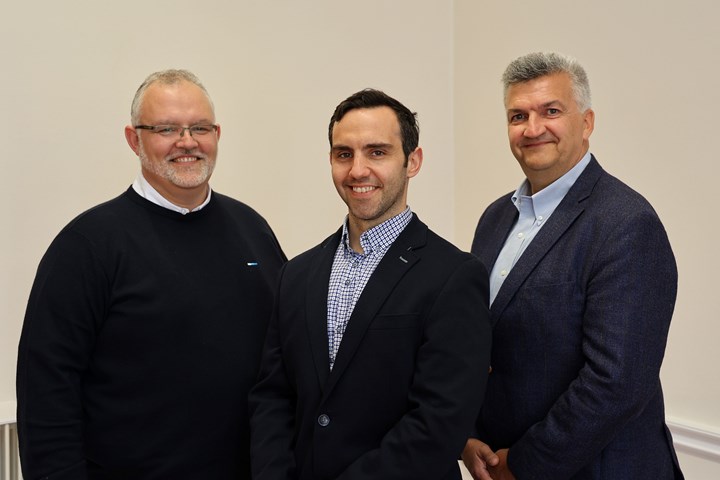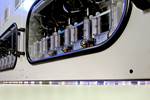PlasmaBound closes €2.35 million funding round on controlled polymer ablation technology
PlasmaBound’s aims to accelerate its high-speed composite bonding technology to make sustainable composites a standard feature on vehicles, devices and structures on a global scale.

Pictured left to right at NovaUCD are PlasmaBound co-founders, Alan Barry, Dr. James Nicholas Barry and Xavier Montibert. Photo Credit: Nick Bradshaw, Fotonic
PlasmaBound (Dubin, Ireland), a University College Dublin (UCD) spin-out, and a company that pretreats fiber-reinforced composites, announced on May 1 the completion of a €2.35 million ($2.46 million) funding round, led by Dublin-based Act Venture Capital, and supported by the Atlantic Bridge University Fund, Enterprise Ireland and a number of private investors. The funding will permit rapid acceleration on the path toward enabling its vision of sustainable lightweight materials being a standard feature on vehicles, devices and structures, globally, without the complexity, cost and waste involved.
PlasmaBound’s controlled polymer ablation (CPA) technology is said to be attracting interest in several sectors, where it empowers global industry to achieve their sustainability goals, particularly in carbon reduction and battery range extension. The technology is deployed in a software as a service (SaaS) model, with term-based licensing.
CPA enables high-speed bonding of ultra-lightweight composite materials in a manner where it will effectively take on a role similar to welding in metals. PlasmaBound says this will collapse operational cycle times, extend shelf life and reduce manufacturing waste streams, all while improving ultimate bond strengths.
“Our technology is about getting more renewable, lightweight materials into use faster as we seek a more sustainable carbon-reduced future,” Alan Barry, CEO, PlasmaBound, contends. “We are excited to continue our rapidly accelerating journey toward enabling these materials to be standard on vehicles, structures and devices. Right now, this is limited by cost and complexity to only high-tech applications, or premium price points, with limited real environmental impact. Pushing recyclable composites into mainstream mass-production will move the dial on all our efforts for a sustainable tomorrow. This funding signals confidence in this opportunity.”
PlasmaBound, headquartered at NovaUCD, was co-founded in 2017 by Dr. James Nicholas Barry, Alan Barry and Xavier Montibert as a spin-out from the UCD College of Engineering and Architecture following the completion of Enterprise Ireland Commercialisation Funding.
Related Content
-
Recycling hydrogen tanks to produce automotive structural components
Voith Composites and partners develop recycling solutions for hydrogen storage tanks and manufacturing methods to produce automotive parts from the recycled materials.
-
Recycling end-of-life composite parts: New methods, markets
From infrastructure solutions to consumer products, Polish recycler Anmet and Netherlands-based researchers are developing new methods for repurposing wind turbine blades and other composite parts.
-
Natural fiber composites: Growing to fit sustainability needs
Led by global and industry-wide sustainability goals, commercial interest in flax and hemp fiber-reinforced composites grows into higher-performance, higher-volume applications.
















